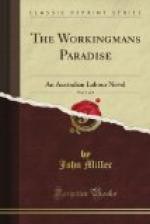“For the past, who would not choose it? Who would not, if they could, drop civilisation from them as one shakes off a horrid nightmare at the dawning of the day? Who would not be again a drover of cattle, a follower of the plough, a milker of cows, a spinner of wool-yarn by the fireside, to be, as well, strong and fierce and daring, slave to none and fearing none, ignorant alike of all the wisdom and all the woes of this hateful life that is?
“For only one moment of the past if the whole past could not be! Only to be free for a moment if the rest were impossible! Only to lose one’s hair and bare one’s feet and girdle again the single garment round one’s waist and to be filled with the frenzy that may madden still as it maddened our mothers when the Roman legions conquered! Only to stand for a moment, free, on the barricade, outlawed and joyous, with Death, Freedom’s impregnable citadel, opening its gates behind—and to pass through, the red flag uplifted in the sight of all men, with flaming slums and smoking wrongs for one’s funereal pyre!”
* * * * *
So Nellie thought in her indignation and sorrow, changing the wet cloth on the baby’s head, powerless to help it, uncomforted by creeds that moulder in the crimson-cushioned pews. She knew that she was unjust, carried away by her tumultuous emotions, knew also, in her heart, that there was something more to be desired than mere wild outbreaks of the despairing. Only she thought, as we all think, in phases, and as she would certainly have talked had opportunity offered while she was in the mood, and as she would most undoubtedly have written had she just then been writing. The more so as there was a wave of indignation and anger sweeping over Australia, sympathetic with the indignation and anger




